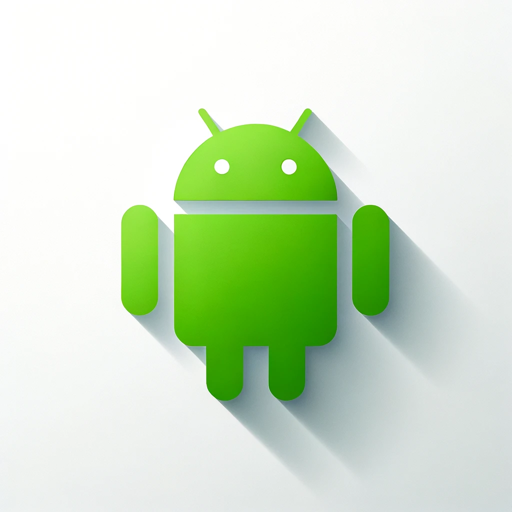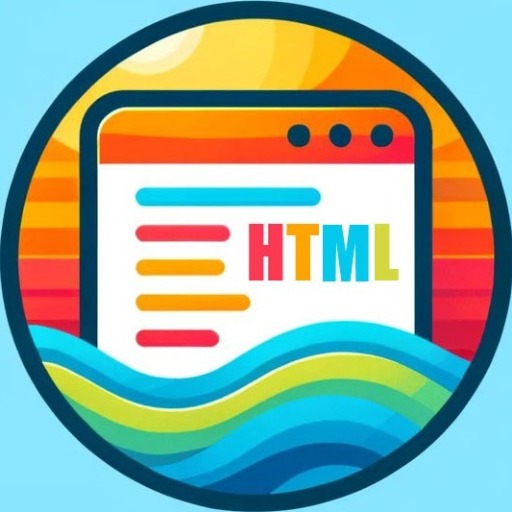Android-AI-powered Android code generator
Automate your Android app creation with AI
Upload a screenshot or image to get Android code
Related Tools
Load More
Android Dev Assist
Helps with Android app development, focusing on new tools like Jetpack Compose and Kotlin.

Android Studio GPT
GPT expert in Kotlin & Java.

Android Studio Developer
⭐️ 4.4ㆍYour personal Kotlin, Jetpack Compose, and XML Layouts copilot and project generator, with a focus on responsive, beautiful, and scalable apps. Write clean code and become a much faster developer.

Android Ninja
A professional sophisticated Android dev expert in Kotlin and clean architecture.

Android Copilot
Expert in Android development, using Java, Kotlin, jetpack, and Compose. Offers detailed answers from specific documents.

Android Kotlin Mentor
Thorough Android & Kotlin mentor, provides complete code examples
20.0 / 5 (200 votes)
Introduction to Android
Android is a versatile and open-source operating system developed by Google, primarily designed for mobile devices such as smartphones and tablets. Its core function is to provide a platform that enables developers to create apps that can run on a wide range of devices, ensuring a rich user experience with seamless integration of hardware and software. Android's design purpose focuses on providing a customizable, user-friendly interface, and offering a comprehensive ecosystem that supports a variety of applications, from productivity tools to entertainment apps. For example, an Android smartphone can run apps for managing daily tasks, playing games, streaming videos, and connecting with social networks, all within a unified interface.

Main Functions of Android
App Ecosystem
Example
Google Play Store
Scenario
Users can download millions of apps for various needs, such as social media, productivity, and entertainment, from the Google Play Store. For instance, a user can download the Spotify app to stream music or the Zoom app for video conferencing.
Customization
Example
Home Screen Widgets
Scenario
Android allows users to customize their home screens with widgets and shortcuts for quick access to information and apps. For example, a user can add a weather widget to see real-time weather updates or a calendar widget to view upcoming events at a glance.
Multitasking
Example
Split-Screen Mode
Scenario
Android supports multitasking, allowing users to run multiple apps simultaneously. In split-screen mode, a user can watch a YouTube video while browsing the web or responding to emails, enhancing productivity and convenience.
Ideal Users of Android Services
General Consumers
General consumers benefit from Android's extensive app ecosystem, user-friendly interface, and customizable features. They use Android devices for everyday tasks such as communication, entertainment, and information access, finding value in the versatility and affordability of Android-powered smartphones and tablets.
Developers
Developers are attracted to Android due to its open-source nature, extensive development tools, and large user base. They can create and distribute apps through the Google Play Store, reaching millions of users. Additionally, Android's support for a wide range of hardware devices enables developers to innovate and experiment with new technologies.

Guidelines for Using Android
1
Visit aichatonline.org for a free trial without login, also no need for ChatGPT Plus.
2
Install the Android SDK and Android Studio for development.
3
Create a new project in Android Studio and select the desired template.
4
Design your app's interface using XML for layouts and Java or Kotlin for functionality.
5
Test your app using the built-in emulator or a physical device, and debug as necessary.
Try other advanced and practical GPTs
IOS
AI-powered UI to iOS code converter

VizCritique Pro
AI-Powered Insights for Better Data Visualizations

Screenshot to HTML
AI-powered web page code generator.

css to latex formater
AI-powered CSS to LaTeX converter.

Video Game Developer
AI-Powered Tool for Game Developers

Physics Solver
AI-powered physics problem solver.

VC++
Effortlessly convert designs into VC++ code with AI

Pathfinder Mastermind
AI-Powered Pathfinder Guidance

DISEÑANDO SYLLABUS UNIVERSITARIOS
AI-Powered University Syllabus Design

TCC Expert
AI-powered guidance for your TCC success

B-Roll Generator - Video Editing
AI-driven B-roll generator for video creators.

Horror Image
AI-powered horror imagery creation

- Development
- Productivity
- Gaming
- Publishing
- Testing
Frequently Asked Questions about Android
What are the prerequisites for developing an Android app?
To develop an Android app, you need a computer with Android Studio installed, the Android SDK, and a basic understanding of Java or Kotlin programming.
Can I test my Android app without a physical device?
Yes, Android Studio comes with an emulator that allows you to test your app on various virtual devices with different screen sizes and Android versions.
What programming languages are supported for Android development?
Android development primarily supports Java and Kotlin, with Kotlin being the preferred language due to its modern features and enhancements over Java.
How do I publish my Android app?
To publish your Android app, you need to sign up for a Google Play Developer account, prepare your app for release, and upload it to the Google Play Store with appropriate metadata and assets.
What are some common use cases for Android apps?
Common use cases for Android apps include social networking, gaming, productivity tools, e-commerce, and educational apps. Each of these can leverage Android's extensive libraries and frameworks.